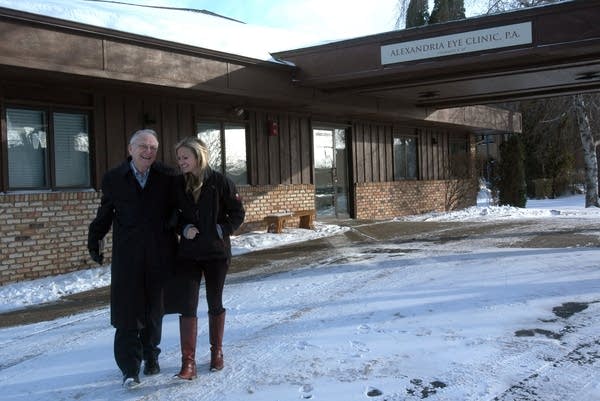Retired doctor is determined to help Ebola-stricken Sierra Leone

Go Deeper.
Create an account or log in to save stories.
Like this?
Thanks for liking this story! We have added it to a list of your favorite stories.
The Centers for Disease Control and Prevention continues to advise against any non-essential travel to Sierra Leone because of the Ebola crisis there.
But that's not stopping 93 year-old Lowell Gess from traveling to Sierra Leone in January.
• More MPR News Ebola coverage

Gess, a retired ophthalmologist who lives in Alexandria, has a relationship to Sierra Leone that goes back half a century, when he first went there as a medical missionary. Although he no longer treats patients because of his age, he's ready to help in other ways, even at the risk of contracting Ebola.
Turn Up Your Support
MPR News helps you turn down the noise and build shared understanding. Turn up your support for this public resource and keep trusted journalism accessible to all.
People who don't know Gess might be surprised at how he laughs about risking death. Take, for example, the time when rebel fighters encroached upon the eye hospital where Gess was treating patients in Sierra Leone's capital of Freetown in the 1990s, during the country's bloody civil war.
"One time when we were seeing patients, suddenly it sounded like the atomic bomb," he recalled of a day when rebels invaded Freetown. "It continued after dark. When bullets were flying around, I just went to bed," he says with a chuckle.
Trim, neatly dressed in a grey sport coat, Gess, who is almost always smiling, looks much younger than his age.
As he prepares to return to Sierra Leone on Jan. 3, he's once again cheerfully dismissive of the perils he could face — including Ebola.
"When you're at a certain age you just keep your fingers crossed you won't have a stroke or heart attack before January 3," he said.
But Gess's radiant smile disappears when he talks about his reasons for returning to Sierra Leone. Ebola cases are rising. The crisis is still acute.
He won't play an active role in treating Ebola patients. But he says he will have contact with patients at the eye hospital, helping staff diagnose difficult cases of eye disease. He'll also take about $100,000 in eye medicines and equipment — donations he procured himself. And he'll repair aging equipment at the eye hospital.
Above all else, though, Gess wants to lend moral support to the people he loves.

"Just being there with them facing this terror every day is encouraging because they feel abandoned," he said. "They think that the world really has abandoned them."
Born in 1921 in Paynesville, Gess graduated from Macalester College and then went to seminary and medical school. In the 1950s, he and his wife Ruth, a nurse, arrived in Africa as medical missionaries. They stayed in Sierra Leone for about two decades, raising their six children there.
As Gess thumbed through old photos of his time in Sierra Leone, he recalled trekking into the bush to treat patients suffering from cataracts or a disease called river blindness. He said most people in the hinterland had never seen a doctor.
Sometimes, Gess would perform eye surgeries outdoors — with a throng of villagers watching over him.

"I have to do everything in front of people because of their belief in witchcraft and all that," he explained.
But Gess said once his patients' vision returned the next day, their skepticism faded.
In 1984, Gess established the Kissy UMC Eye Hospital in Freetown under the auspices of the United Methodist Church. By then, he had moved his family back to the Midwest.
But he continued to make annual pilgrimages to Sierra Leone to help out at the hospital. His wife, who died a couple years ago, was usually by his side. Sometimes Gess traveled with his adult children or grandchildren — several of whom also became ophthalmologists.
Gess's granddaughter, Debby Ristvedt, an eye doctor in Alexandria, has traveled with him to Sierra Leone before and wishes she could do so on his next trip. But the trip is not practical as she has two small children. Her grandfather will make the long journey alone.
Like other family members, Ristvedt seems to have stopped worrying about her grandpa and is just happy that he's following his heart.
"I'm excited for you Grandpa," she told him. "And I'm proud of you."

"They're hurting there," he replied. "And if we can help a little bit, that will be nice."
Ibrahim Conteh, the administrator at the Kissy UMC Eye Hospital, has known the Gess family for decades. He said the medicine and equipment Gess is bringing will be a big help, as medical supplies have been harder to come by in the Ebola crisis.
Still, Conteh said he's a bit nervous about his 93 year-old mentor traveling in the midst of the Ebola outbreak.
"I'm a little concerned about his coming but I don't think that will stop him to come to Sierra Leone," he said.
Gess said if he does contract Ebola while in Sierra Leone, he would not return to the United States for treatment, even if that means dying in the country he regards as his second home.
Editor's note: This story has been changed to clarify Dr. Gess's role at the clinic Sierra Leone.


